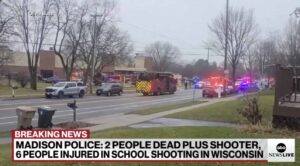
WASHINGTON (BP) — On Christmas Day, churches were bombed in five Nigerian cities — Madalla (a suburb of the capital Abuja), Jos, Kano, Damaturu and Gadaka — leaving dozens, perhaps hundreds, dead or wounded. The killings apparently were the latest handiwork of the violent Islamist group Boko Haram, and they show an increased level not only of violence but also of sophistication, since the explosions were coordinated and widespread, including the northwest, north and center of the country.
These killings mark a further escalation in the growth of radical forms of Islam in Africa’s most populous country.
Muslims are a majority in the northern part of Nigeria, Christians are a majority in the south, and the two are about evenly mixed in the middle belt, which has often been the scene of violent conflict. This conflict has tribal and regional dimensions and involves political power, land and resources, but there also is persistent religious tension.
Beginning in 1999, sharia law, hitherto applicable only to matters of family and personal status, was imposed in 12 northern states, effectively making Islam the de facto official religion in those states, in contravention of the federal constitution. Kano State formed a 9,000-strong Hisba (sharia-enforcement) force. Conflict over sharia led to thousands of deaths.
At about this time, a group named al-Sunna Wal Jamma, and nicknamed “the Taliban,” began attacking Christian settlements in Borno State from bases in the hills of neighboring Cameroon. In January 2004, the group led a violent uprising in Yobe State, displacing 10,000 people before federal forces succeeded in quashing it. In January 2007, the publisher of the Daily Trust newspaper was charged in the Abuja High Court with receiving money from al-Qaeda to fund the Nigerian Taliban, including payment for people to go for terrorist training in Mauritania. In early 2007, there were further attacks on the police in Kano by a group calling itself the Taliban, leaving dozens dead.
The Nigerian Taliban’s current official name is Jama’atu Ahlis Sunna Lidda’awati wal-Jihad, but it is more usually known by its nickname, Boko Haram, which translates roughly as “Western civilization is forbidden.” In late July 2009, around the town of Maiduguri in the northwest, it attacked police stations, prisons, schools, churches and homes, burning nearly everything in its path.
The violence spread to Borno, Kano and Yobe, where Boko Haram treated as infidel anyone — Christian or Muslim — who did not conform to its views. Christians were a particular focus of the violence. Many were abducted and forced, under threat of death, to renounce their faith. The riots continued for five days before police were able to stop them, with 700 people killed in Maiduguri alone.
One arrested Boko Haram member, 23-year-old Abdulrasheed Abubakar, confessed to receiving $5,000 and military training in Afghanistan, with the promise of $35,000 on his return there. On Aug. 9, 2009, the group released a statement aligning itself with al-Qaeda and calling for jihad in response to the killing of its leader, Mallam Mohammed Yusuf. There are also reports that some of its members have trained with militants in Mali linked to the organization al-Qaeda in the Islamic Maghreb (AQIM).
Boko Haram has now added bombing to its tactics. In August 2011, it claimed responsibility for the suicide bombing of the U.N. headquarters in Abuja, which killed 23 people. While it continues to attack security forces and outposts of Western influence, it is focusing its major attention on killing and displacing Nigeria’s Christian population, which, at some 80 million, is the sixth-largest in the world. It is also picking Christmas as a focal time for attacks, a practice being followed by its international allies. In 2010, it attacked five churches in Jos as the congregations were celebrating Christmas Eve.
Boko Haram has declared that it is in a “holy struggle to oust the secular regime and entrench a just Islamic government” and that it will “hunt and gun down those who oppose the rule of sharia in Nigeria and ensure that the infidel does not go unpunished.” Its increased sophistication and contacts with other terrorist groups make it a threat not only to the country’s Christians and traditional Muslim leaders, but to the stability of Nigeria as a whole.
–30–
Paul Marshall is a senior fellow at the Hudson Institute’s Center for Religious Freedom and co-author with Nina Shea of “Silenced: How Apostasy & Blasphemy Codes Are Choking Freedom Worldwide” (Oxford University Press, 2011).













